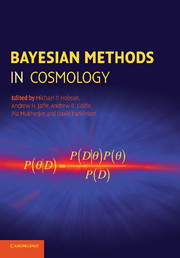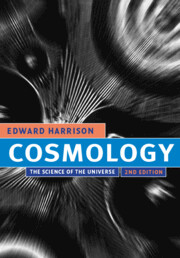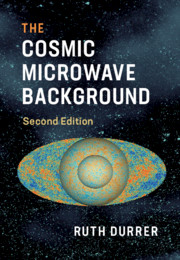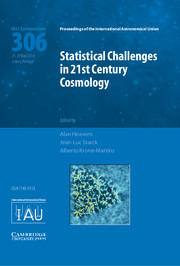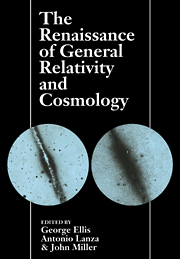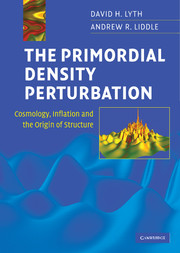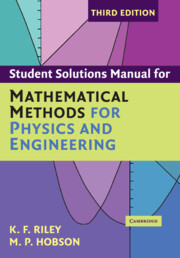Bayesian Methods in Cosmology
$54.99 USD
- Editors:
- Michael P. Hobson, University of Cambridge
- Andrew H. Jaffe, Imperial College of Science, Technology and Medicine, London
- Andrew R. Liddle, University of Sussex
- Pia Mukherjee, University of Sussex
- David Parkinson, University of Sussex
- Date Published: June 2010
- availability: This ISBN is for an eBook version which is distributed on our behalf by a third party.
- format: Adobe eBook Reader
- isbn: 9780511764004
Find out more about Cambridge eBooks
$
54.99 USD
Adobe eBook Reader
Other available formats:
Hardback, Paperback
Looking for an inspection copy?
This title is not currently available on inspection
-
In recent years cosmologists have advanced from largely qualitative models of the Universe to precision modelling using Bayesian methods, in order to determine the properties of the Universe to high accuracy. This timely book is the only comprehensive introduction to the use of Bayesian methods in cosmological studies, and is an essential reference for graduate students and researchers in cosmology, astrophysics and applied statistics. The first part of the book focuses on methodology, setting the basic foundations and giving a detailed description of techniques. It covers topics including the estimation of parameters, Bayesian model comparison, and separation of signals. The second part explores a diverse range of applications, from the detection of astronomical sources (including through gravitational waves), to cosmic microwave background analysis and the quantification and classification of galaxy properties. Contributions from 24 highly regarded cosmologists and statisticians make this an authoritative guide to the subject.
Read more- The only comprehensive introduction to Bayesian cosmology, an essential reference for graduate students and researchers
- Contains contributions from a wide range of experts, including cosmologists and statisticians
- Describes methods and techniques in detail, and covers wide range of applications
Customer reviews
Not yet reviewed
Be the first to review
Review was not posted due to profanity
×Product details
- Date Published: June 2010
- format: Adobe eBook Reader
- isbn: 9780511764004
- availability: This ISBN is for an eBook version which is distributed on our behalf by a third party.
Table of Contents
Preface
Part I. Methods:
1. Foundations and algorithms John Skilling
2. Simple applications of Bayesian methods D. S. Sivia and Steve Rawlings
3. Parameter estimation using Monte Carlo sampling Antony Lewis and Sarah Bridle
4. Model selection and multi-model interference Andrew R. Liddle, Pia Mukherjee and David Parkinson
5. Bayesian experimental design and model selection forecasting Roberto Trotta, Martin Kunz, Pia Mukherjee and David Parkinson
6. Signal separation in cosmology M. P. Hobson, M. A. J. Ashdown and V. Stolyarov
Part II. Applications:
7. Bayesian source extraction M. P. Hobson, Graça Rocha and R. Savage
8. Flux measurement Daniel Mortlock
9. Gravitational wave astronomy Neil Cornish
10. Bayesian analysis of cosmic microwave background data Andrew H. Jaffe
11. Bayesian multilevel modelling of cosmological populations Thomas J. Loredo and Martin A. Hendry
12. A Bayesian approach to galaxy evolution studies Stefano Andreon
13. Photometric redshift estimation: methods and applications Ofer Lahav, Filipe B. Abdalla and Manda Banerji
Index.-
General Resources
Find resources associated with this title
Type Name Unlocked * Format Size Showing of
This title is supported by one or more locked resources. Access to locked resources is granted exclusively by Cambridge University Press to lecturers whose faculty status has been verified. To gain access to locked resources, lecturers should sign in to or register for a Cambridge user account.
Please use locked resources responsibly and exercise your professional discretion when choosing how you share these materials with your students. Other lecturers may wish to use locked resources for assessment purposes and their usefulness is undermined when the source files (for example, solution manuals or test banks) are shared online or via social networks.
Supplementary resources are subject to copyright. Lecturers are permitted to view, print or download these resources for use in their teaching, but may not change them or use them for commercial gain.
If you are having problems accessing these resources please contact [email protected].
Sorry, this resource is locked
Please register or sign in to request access. If you are having problems accessing these resources please email [email protected]
Register Sign in» Proceed
You are now leaving the Cambridge University Press website. Your eBook purchase and download will be completed by our partner www.ebooks.com. Please see the permission section of the www.ebooks.com catalogue page for details of the print & copy limits on our eBooks.
Continue ×Are you sure you want to delete your account?
This cannot be undone.
Thank you for your feedback which will help us improve our service.
If you requested a response, we will make sure to get back to you shortly.
×
